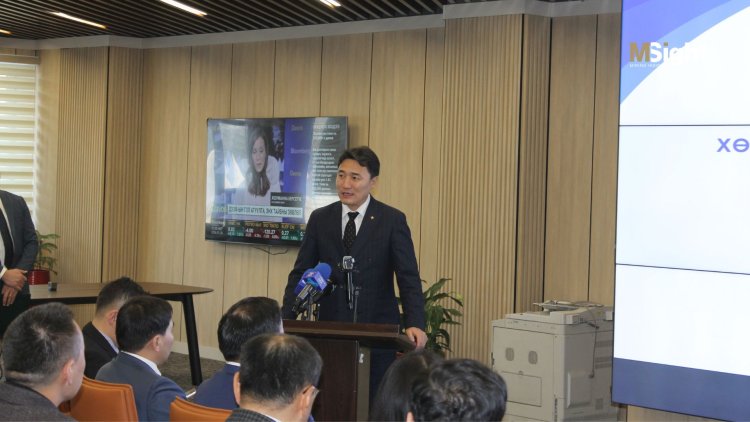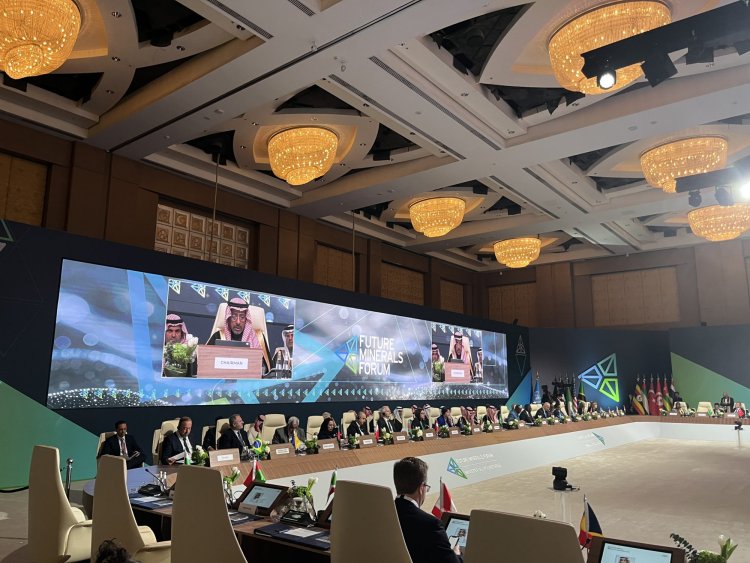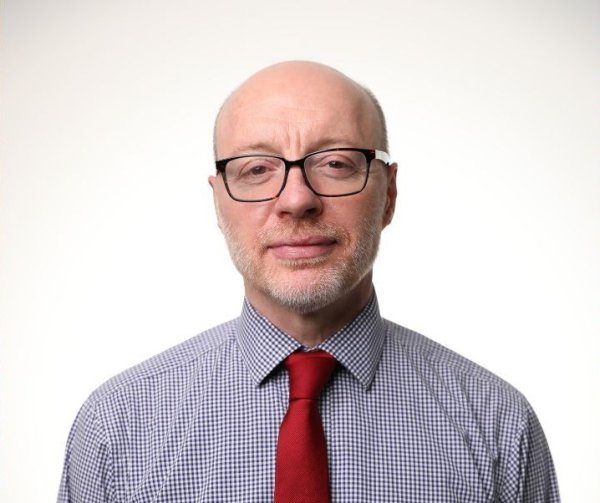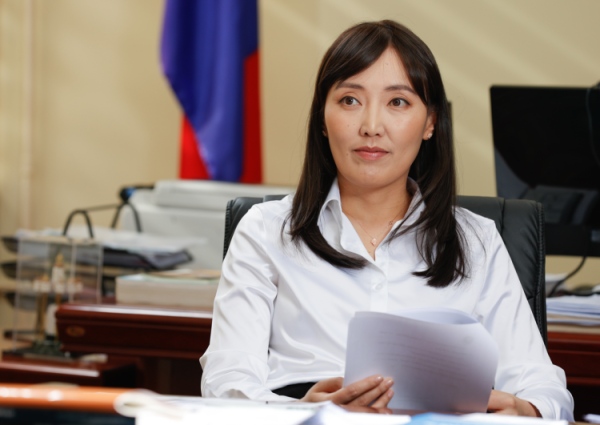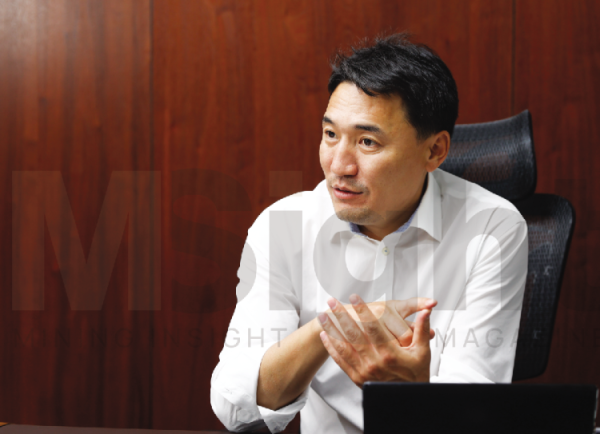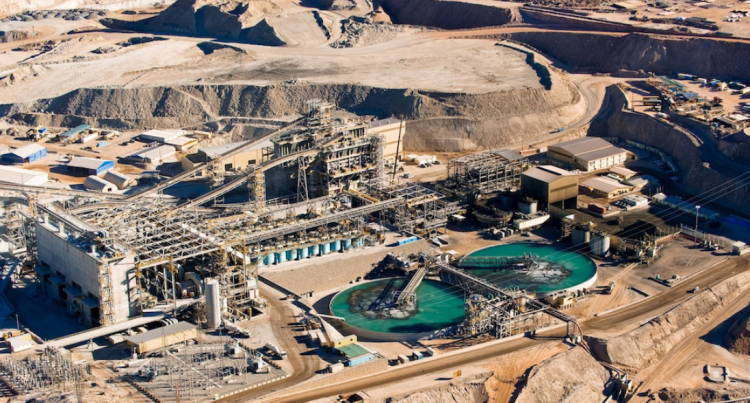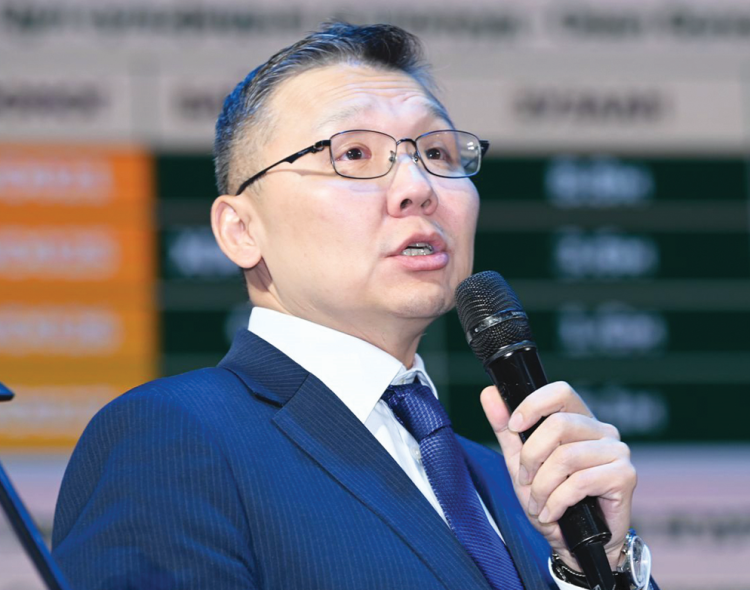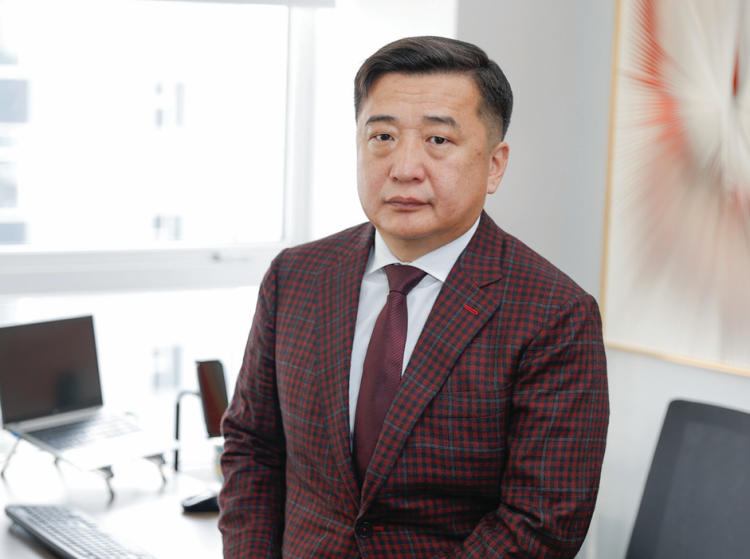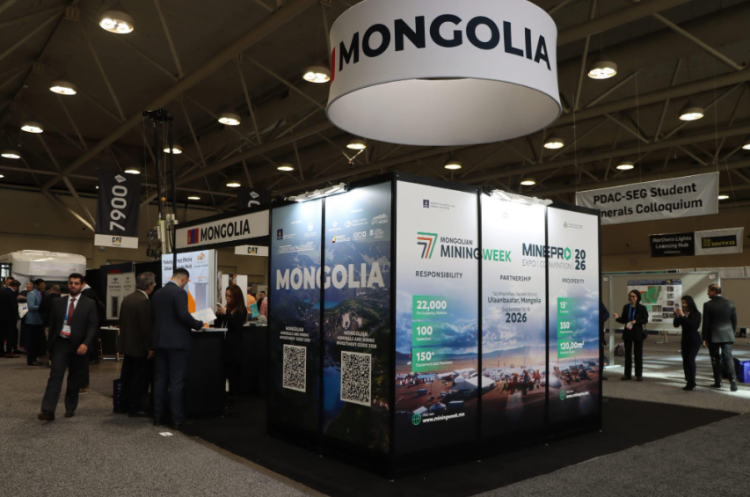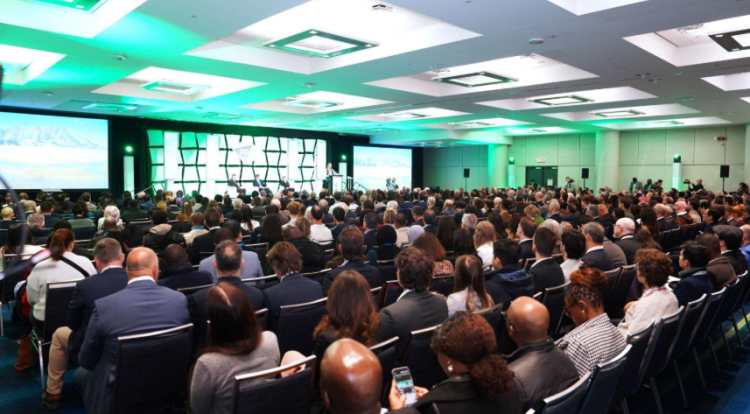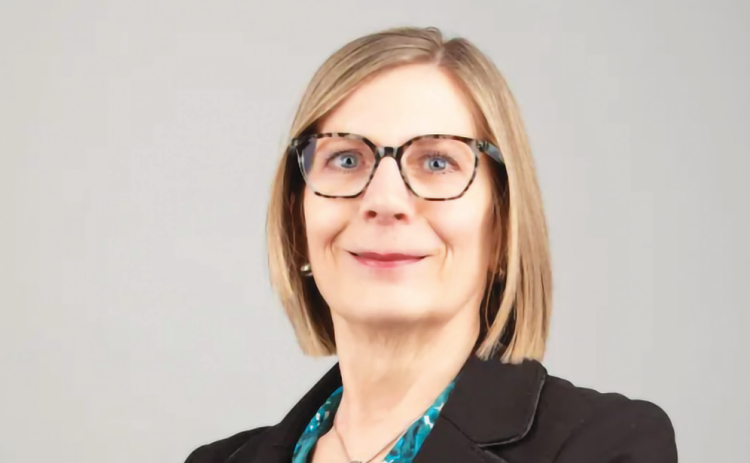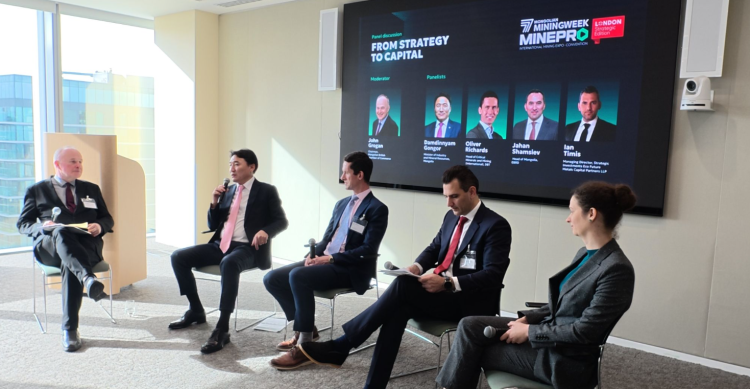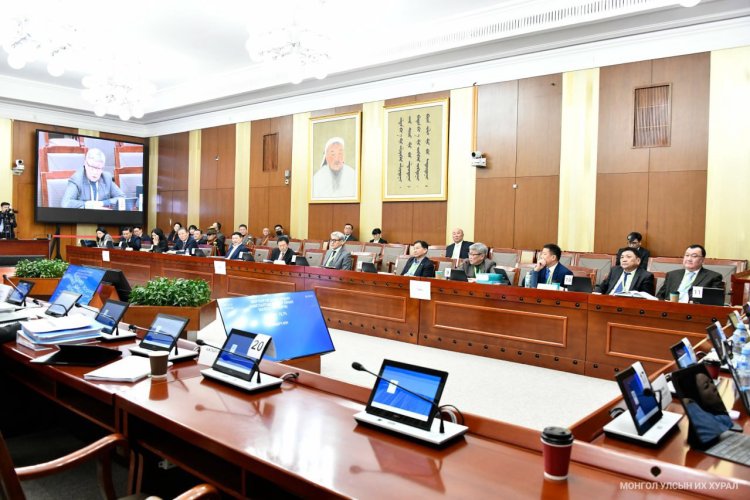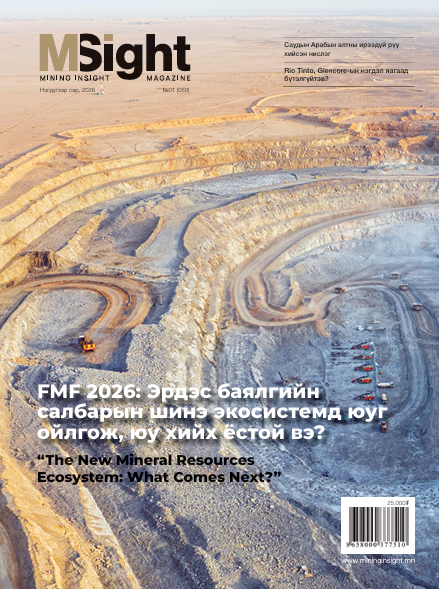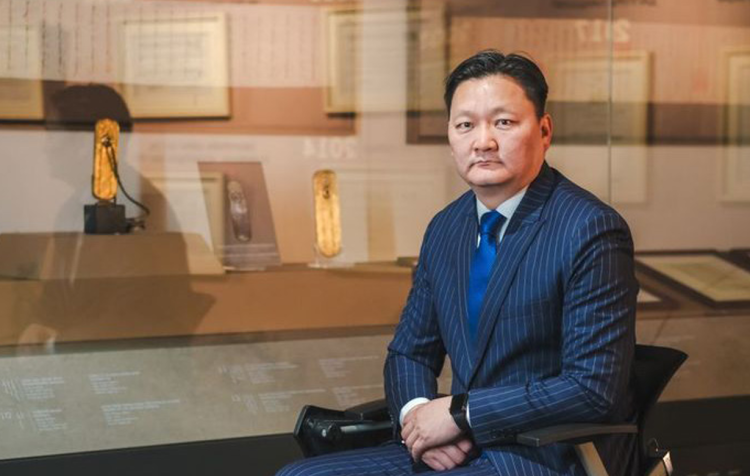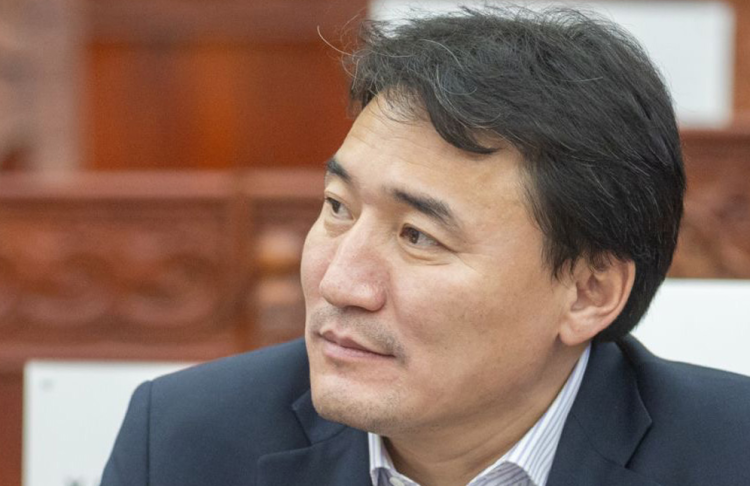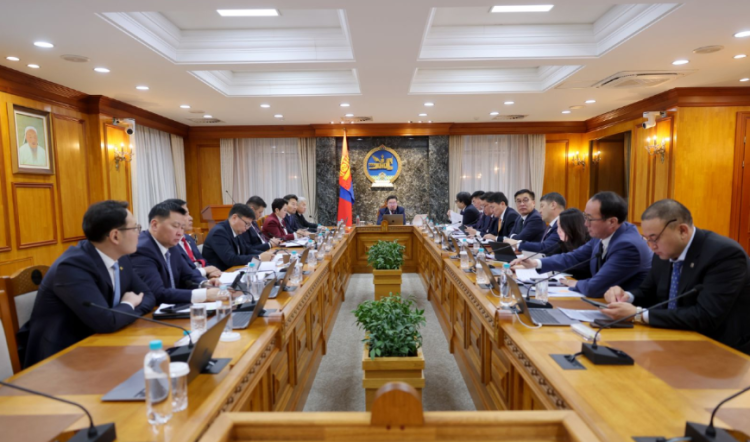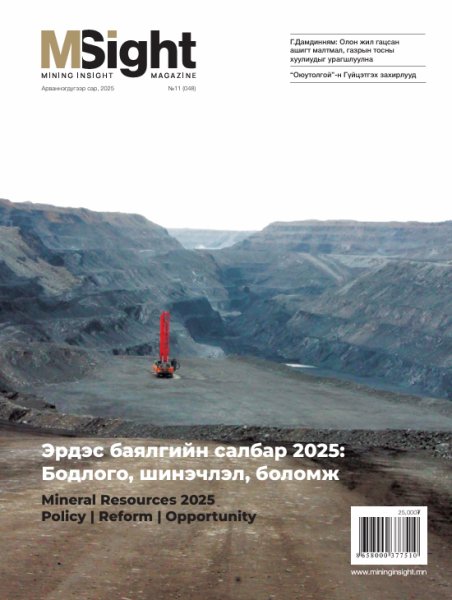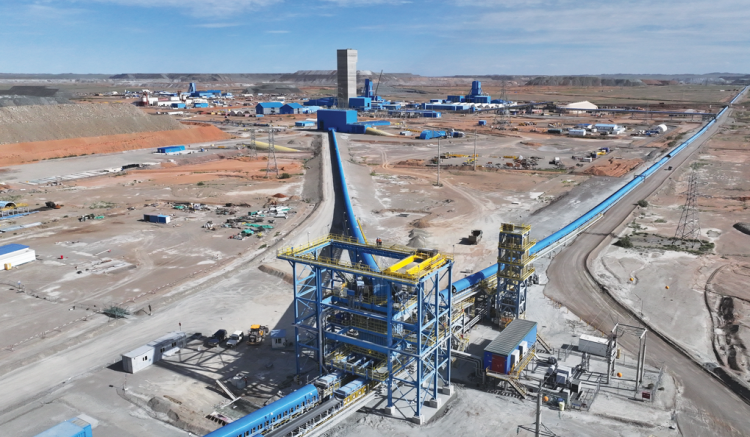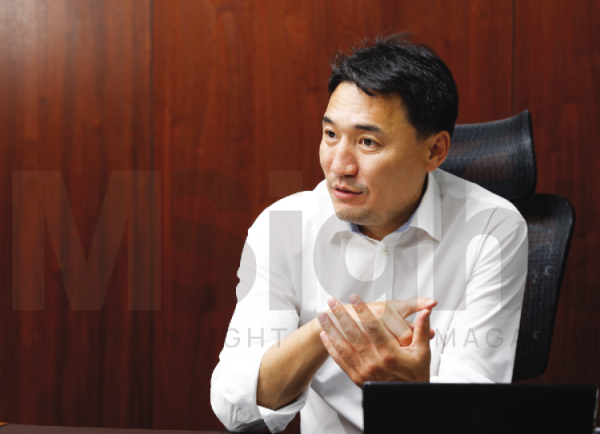 “Mining Insight” magazine’s N. Ariuntuya sat down with Minister of Industry and Mineral Resources G. Damdinnyam for an interview. This conversation with the Minister marks his very first in-depth interview with the press since his appointment as the Minister of the sector. He candidly discussed the challenges that have accumulated in the sector, as well as possible solutions, and openly shared his vision of the future direction of Mongolia’s mining and industrial policies. From the Minister’s detailed interview, readers can gain a clear outlook on how the sector’s development roadmap will take shape in the coming years.
“Mining Insight” magazine’s N. Ariuntuya sat down with Minister of Industry and Mineral Resources G. Damdinnyam for an interview. This conversation with the Minister marks his very first in-depth interview with the press since his appointment as the Minister of the sector. He candidly discussed the challenges that have accumulated in the sector, as well as possible solutions, and openly shared his vision of the future direction of Mongolia’s mining and industrial policies. From the Minister’s detailed interview, readers can gain a clear outlook on how the sector’s development roadmap will take shape in the coming years.
A POLICY CANNOT BE BASED ON JUST ONE OR TWO PRODUCTS. A SEPARATE POLICY NEEDS TO BE DEVELOPED FOR EACH MINING PRODUCT’S CHARACTERISTICS
Since your appointment as Minister, you have visited quite a few mines and factories, and met with many stakeholders. You must have gained a broad picture of the sector’s overall situation. In your view, what are the most urgent issues that need to be changed, and how?
I am not new to this sector. I had already studied and worked closely with the sector. I had studied mining policy and governance before, so there was nothing particularly surprising or shocking to me. Although people often say that Mongolia’s economy depends on mining that currently it puts food on our table I see that the sector needs strong professional leadership and special approaches to ensure it communicates itself properly to society and maintains social consensus. I had this thought before, but now that conviction has only deepened. That said, this issue of social license is not unique to Mongolia; it is a challenge faced by every mining country. This is not a new thing. One key obstacle to investment is that the sector has failed to communicate its role to society in the right way. Beyond talking about its contribution in terms of economic figures, we need to explain why mining is important, why it is being pursued, what mining actually is, how the revenues are distributed, and how these revenues are allocated at the local level. Many of today’s disputes arise because people do not understand these things. I observed that the sector’s public engagement and communication work has been weak. Our sector must operate on a balanced triangle of three parties: the government, companies, and citizens. If the government focuses too heavily on its own interests, the sector stalls. If private companies chase only profit, progress is also blocked. And if policies lean excessively toward citizens that is, populism the industry cannot move forward either. This is not only Mongolia’s challenge but a common dilemma in all countries with mining-based economies. Those who manage to overcome it are the ones advancing. Those who can’t are left behind. The way to address it is through professional policy and governance. And that responsibility to regulate it with sound policies lies with the government: to strike the right balance between the state, citizens, and companies, and to govern accordingly.
As coal prices fall and export revenues slow, the risks of our economy’s overdependence on mining are becoming increasingly evident. In this situation, how do you see the path to keeping the mining sector as a driver of sustainable economic growth?
Mining is an industry that always exists within price fluctuations, so I do not view this downturn cycle as entirely good or bad. To joke a little, I might be the only minister who welcomes the period of falling commodity prices. Why? Because it means that the many problems in our sector, which have long been discussed but never properly addressed, are now recognized more clearly by all stakeholders both the public and the government as issues that must be solved. In this sense, a crisis should be seen as an opportunity. A downturn forces us to look at the sector with differentl approach, to acknowledge its accumulated problems, and to realize that they must be genuinely resolved. From that perspective, this is not such a bad time for us. Secondly, in order to pursue sound policies in industry and mineral resources, Mongolia must develop seperate policy for each mining product it has. For rare earth elements, gold, copper, iron, and others, we need to calculate and develop tailored strategies. Building an economy and sector based solely on coal has been a mistake, pushing us into a very vulnerable position. We now have an economy that is measured by how many trucks of coal cross the border each day an extremely fragile situation. This is a very big risk, very big mistake. Countries with diverse mineral resources craft distinct policies for each product, thereby cushioning themselves against cycles. In Canada, where I studied and graduated, as well as in mining leaders like Australia, it can be seent that high-volume bulk commodities are governed by one set of policies, while high-value, low-transport-cost commoditi such as gold and rare earth elements follow separate policies. One interesting pattern is relevant to us. That is when iron ore prices fall, coal prices also decline; but at the same time, prices of base metals like gold and copper often rise. However, we have essentially imposed a ban on foreign investment in the copper sector. This means that we need to develop both together. This means our policy must focus on developing new minerals, building competitiveness. The revenues we currently rely on from coal should eventually be replaced by income from other resources. We need to diversify mining with multiple mineral products. That way, we will not fear downturns, and be able to have stability. One example: Canada’s Teck Resources operates coal, iron ore, and base metal mines. No matter what economic conditions arise, the company remains stable and operational. That is what mining policy and professional operations look like. In Mongolia, this has not been done yet. But we will aim to do it.
When and how will the new mining policy be developed, and in what order? How will it differ in principle from the 2014 “State Policy on the Minerals Sector”?
We are a country competing on the global stage. Gold, copper, coal, uranium, and rare earth elements are not found only in Mongolia. More than 90 other countries in the world have similar resources. To compete with them, we must offer investors better opportunities than those countries. How we do this is the homework for our government. We need a comprehensive natural resource management policy that defines what kind of economy to build based on our resources, which sectors to prioritize, which deposits to develop, which products to promote, and in what sequence. It must also set out which areas we will emphasize for exploration, what size of investment we are creating a favorable environment for, which lands we will preserve for tourism, which for livestock and agriculture. At the moment we do not have this. In other words, we must “measure our blanket before stretching out our legs” carefully assess our capacity and then decide which direction to move in. If we just drift with short-term trends, we will fail to implement stable policies, fail to ensure stable operations, and fail to secure stable revenues. This also means we will fail to be a stable partner, And without stable partnerships, no one will want to invest. Without investment, no new deposits will be developed, no mines will be built. That means no new jobs, no new housing, no new schools, kindergartens, or hospitals, no new roads, and no increase in salaries and pensions. This is why mining policy is so critical. We must therefore have a proper policy document, and under its framework we must make the necessary legal amendments. We need to look 10, 20, 30 years ahead: what level will Mongolia’s mining reach, and to what degree will we process the raw materials we extract? This must be calculated and planned. Such work must be carried out not by politicians but by researchers both from international research institutions and from our own academic community. We have already started this process, holding discussions and seeking cooperation with other ministries and international donor organizations. By contrast, the policy approved in 2014 consisted of just two pages. To claim that the mining policy of an entire country could fit into that space was, frankly, “remarkable.” A true national resource policy should determine which areas to leave untouched, which to protect, which to develop, which to mine and rehabilitate, and which to preserve as water resources. It is, by nature, a much broader and more comprehensive undertaking. That is exactly what we are now trying to accomplish.
You mentioned that the Minerals Law will not be fully revised but amended. Yet within the sector there were clear understanding and expectations of major changes under a full revision. Why amendments instead, and which of the sector’s many challenges are you aiming to address first?
The idea of revising the Minerals Law has been discussed for years, but never implemented. A full revision essentially means rewriting the law almost entirely. For a sector like mining, where stability and predictability are key to attracting investment, rewriting the rules wholesale is risky. If we suddenly introduce an entirely new framework, convincing domestic and foreign investors to accept and adapt to it becomes very difficult. In essence, we would be gambling with our economy. My current position is to identify the four or five most urgent issues and fix them. The rest can be done in stages. Passing amendments is Parliament’s role. If Parliament succeeds, conditions will improve; if not, at least the sector will remain at its current level of stability. In other words, changes will be made for better, will not worsen the current situation, will maintain stability. For investors and businesses, stability even without improvement is already highly valued, since mining requires long-term planning and large capital investment. This sector does not like turbulence. One of the first priorities is exploration sector. There is often public concern, especially on social media, that “all our land has been given away under licenses.” But in reality, 80 percent of Mongolia’s territory cannot be licensed for mining. Only about 20 percent of total land is open to exploration, of which currently 3.1 percent is covered by exploration licenses and 1.3 percent by mining licenses. Yet paradoxically, the number of exploration licenses is half that of mining licenses. This is a serious distortion.
Our generati acquiring a license will become easier, but holding it will be more expensive on is burdening future generations with the consequences of our actions.
Today, Mongolia’s mining revenues which fund salaries, pensions, social insurance, schools, kindergartens, hospitals, and energy are based largely on revenue that came from mining and selling from large deposits discovered through exploration carried out before 1990. However, since we have pursued policies that stifled the exploration sector, we have failed to do the work of studying and preparing resources for future generations, thinking only of our immediate interests instead. Exploration should always be done at least a decade ahead of actual mining. It provides not just geological data but also vital information on that land’s soil, water, and environmental risks. Its findings can even support agriculture by mapping soil composition and water availability. Yet this foundational work has been chronically underfunded. The normal process is that the National Geological Survey identifies prospective areas, hands them over to the Mineral Resources and Petroleum Authority (MRPA), which then auctions them for exploration licenses. But since we are still living off pre-1990 exploration results, and exploration licenses are half as many as mining license, the outlook is troubling not only for future generations but also for international partners. In healthy mining economies, exploration licenses should outnumber mining licenses five- to tenfold, ensuring a pipeline of future mines and shaping the policy according to that. By neglecting this, we are failing in our duty to future generations. To fix this imbalance, we must first build public understanding. We are preparing a program to restructure the licensing system. At present, acquiring a license is expensive, but keeping it is cheap. A license can be held for 10, 20, 30, even up to 100 years at minimal cost and be traded. Licenses are usually won at auction by those with the most money or foreign entities while citizens or small-sized domestic companies are shut out due to prices. Many holders never conduct actual exploration, instead hoarding licenses for speculation or trade. We will flip this model and bring to the international standard: acquiring a license will become easier, but holding it will be more expensive. Only those who actively conduct drilling, exploration, and resource validation with the intent to establish a mine will remain in the sector. For passive speculators, license-holding will become prohibitively costly and nor profitable. This is not just my idea, nor only my ministry’s or the government’s initiative. It is an international best practice followed by successful mining jurisdictions. Aligning with that standard is beneficial for all stakeholders. Secondly, we will establish clear policies for critical minerals. Thirdly, we will resolve outstanding issues related to royalties and the development of processing plants.
Could you clarify the second and third issues you mentioned? Specifically, what kind of policy will Mongolia adopt on critical minerals? And regarding royalties, expectations are high within the sector, society has a different perception, and politics yet another. How will you balance these interests while making changes?
First, royalties are essentially a fee for using land that belongs to the people. In practice, they are almost a barometer of the sector’s health and the state budget’s stability. If royalties are set too high, investors will not come, exploration will stall, mines will not operate, and revenue will not generated. If they are too low, citizens will not see enough benefit from their natural wealth. We must strike the golden balance. That is the direction we are moving in. At present, our system effectively discourages processing and favors raw extraction. Yet we need factories that add value to produce steel from our iron, to smelt our copper. Current regulations, taxes, and royalties in fact penalize processing plants. We will propose change this. We will submit a draft law amendment that will make it profitable to invest in processing, create more jobs, broaden the taxpayer base, and ensure Mongolia becomes not just an extractor, but a producer. As for critical minerals, every country with natural wealth defines which resources are “critical” and creates a tailored investment environment for them. For Mongolia, iron, coal, copper, and gold are already critical, and rare earth elements are increasingly under discussion. We are studying, consulting, and drafting the policy framework for critical minerals, which will then be embedded into law.
Will Mongolia publish and announce a list of critical minerals?
Yes. The United States, Canada, and China have all announced their lists of critical minerals, and Mongolia will move in the same direction. We need to formulate policy hat defines how to attract investment and how to support exploration in this field.
Strategic products will be under special state policy. In other words, we will move away from the uniquely Mongolian concept of a “strategic deposit,” which does not exist internationally, and shift toward the global norm of “strategic minerals.”
The term “strategic deposit” has been politically and socially charged in Mongolia. Over the past year, government decisions to establish state ownership stakes in strategic deposits have created significant uncertainty for the sector and for investors. Many expected that this policy might change with a new government, but recent cabinet decisions suggest it may continue. For instance, the government has announced state participation in secondary copper deposits, revoked certain licenses, and transferred them to Erdenes Mongol. Will this trend continue?
We need to separate two issues. The first concerns the Tugrug Nuur deposit. This site had 19 licenses, of which four were held by Tugrug Nuur Energy. The company committed repeated legal violations of both the Minerals Law and the Law on the Protection of River Headwaters. As a result, its licenses were revoked. It simply means that the provision of the law requiring the cancellation of licenses when holders fail to comply with the law has been enforced. Because this deposit is included in Annex 2 of Parliament Resolution No. 27, the licenses will be given to Erdenes Mongol. This was a lawful process, not a political decision. The revocation was due to repeated non-compliance failing to submit reports, failing to pay fees. It was inevitable, and it applies not only to Tugrug Nuur but to all deposits. The second issue concerns the stockpiles at Erdenet Mining Corporation. These are oxidized, low-grade ores being processed by three different companies. Each operates under a different arrangement: one buys the stockpile, another pays royalties on its production, while the third uses it for free. The fair approach is to establish a single, standard arrangement for all, which will also benefit the people more. In my view, instead of asserting state ownership over secondary deposits, the better system would be to sell them openly through the commodity exchange established by Law on Mining Prodcut Exchange. These stockpiles are already the full property of the state-owned “Erdenet Mining Corporation”. It makes no sense to divide them into 34% or 51% stakes. That debate applies to companies, not to the resource itself. The plants processing the ore are private companies, not state-owned. The resource, however, belongs to the state, and the right, non-disputed way forward is to auction it through the exchange. Anyone could bid, pay their taxes and fees, and compete on equal terms. This would avoid disputes. The ways see it is If we start dividing ownership into 34% and 51%, we will only prolong endless controversy.
You’ve said that the syndrome of taking “strategic deposits” into state ownership must be changed. Some in the sector argue that the concept itself should be abolished and that mining projects should be governed by new principles. What is your position?
To be frank, I hold a fundamentally different view on the concept of a “strategic deposit.” With the passage of the National Sovereign Wealth Fund Law, the constitutional principle that citizens are the true owners of Mongolia’s natural wealth must now be realized. Yet, what we currently see is unfair: if a deposit is large, the state takes more from it; if it is small, it takes less. Second, the most reliable, risk-free source of revenue that should go directly to the people is the mining royalty. But today, part of this revenue is pulled into the state budget. The state captures the most rsik-free income regardless of whether a mine is profitable or not. Meanwhile, the share that should flow to citizens, Accumulation Fund is only given money if the state budget runs a surplus or if state owned companies declare dividends. But in a developing country, the budget should not be in surplus it should be expanding to fund investment in schools, hospitals, and major projects. This means little or nothing ever flows into the fund. On top of that, very few state-owned enterprises are profitable, and even those that are often have their small profits redirected to meaningless things like uneconomic railway projects before reaching the public. Thses decisions made by their Boards, not reaching the Parliament. Since nothing actually reaches the citizens, it is fair for them to say that they have not received anything. On the other hand, mining companies do pay sufficient taxes and fees to the state. Yet the government takes these revenues and spends them elsewhere, creating a situation where the public and the mining companies are pitted against each other The state takes the least risky revenues straight from the middle and funnels them into projects with or without real substance, leaving little direct benefit for the people. On the other hand, when the perception spreads that anything state-owned will automatically benefit you, it naturally fuels demands that the state should own everything. As a result, there is now a tendency to say that all profitable enterprises should be taken over by the state. If this were to happen, it would only work once after that, mining companies would stop operating. Why? Because no one wants to be robbed. This is an extremely harmful policy both for the sector and for the country. So first, the revenue allocation formula for the Wealth Fund must be changed. The portion now siphoned off into the state budget should instead come from dividends of state-owned companies. That way, the government will be forced to ensure its SOEs are run profitably, instead of simply capturing the safest revenues while pushing companies and citizens against each other. Companies pay their taxes to the state, but nothing reaches the people; the state takes everything, and this must change Second, the distribution of royalties must change: a fixed portion can go directly to all citizens, ideally as monthly payments. In addition, royalties should be given more the provinces, soums, and bags where mining takes place. If people’s ancestral pastures have been disrupted by mining, yet their local soum lacks a school or local bag lacks a doctor, of course herders will be angry. How can citizens in Tsogttsetsii, which almost single-handedly powers 10% of Mongolia’s economy, accept the situation when their school building is literally collapsing? Third, the idea that the state should claim the entirety or more than others just because a deposit is large is wrong. These are natural endowments. Large or small, state-owned or private, all should pay royalties into the Wealth Fund according to scale. Bigger projects pay more, smaller projects less, but everyone pays according to their sizes. This will both expand the fund and make the system fairer. From there, we can redistribute to citizens. Those local governments bags, soums, provinces that support responsible mining should receive more, while those that reject mining should receive less. We cannot say that nature in Umnugovi is not nature, while in Arkhangai it is. People can also make a living from tourism without mining. In that case, they simply should not receive a share from royalty revenues It is not fair for Umnugovi, whose land is directly affected, to lack schools, while a province with no mining gets new schools built with mining revenue. This is also the established international best practice Because this has not been the case, the mining sector remains stuck: no progress, no social license, citizens resentful, companies dissatisfied. This is the fault of flawed state policy, and it must be corrected. We are working towards that.
When Prime Minister G. Zandanshatar was appointed, he first raised the issue of a Resource Tax in Parliament. You’ve expanded on this in much greater depth. Should we take this to mean that the National Sovereign Wealth Fund Law will be amended?
Yes.
You’ve also said geological prospecting and exploration will be intensified. Is there a concrete plan to make it more effective and faster?
Of course. The National Geological Survey and the Mineral Resources and Petroleum Authority will expand the areas they prepare. We will also allocate funding for prospecting. In next year’s state budget, a significant amount has already been earmarked for baseline studies. On top of that, there is a need to issue exploration licenses through multiple channels both by application and through tender. The entire process will be made transparent and highly open. Only then can we reinvigorate exploration. At present, on one hand, exploration license issuance has been restricted, and on the other hand, those who hold licenses are afraid to conduct exploration. They fear that if their project grows, the state will suddenly step in and claim 34%, 51%. But if we move away from state grabs and instead require all big or small to simply pay a resource tax, then exploration will proceed without fear, and companies will start working with aim to begin operation. That is the direction we are moving in.
There are quite a few mining projects technically ready for production, but they have not started operating. What is the Ministry’s policy to move these forward?
“Ready” is a relative term. If a project is truly ready, it will start operating. There is no barrier being imposed by the government on private sector projects. In the case of Gatsuurt, it is located within a specially protected area, so it cannot move forward. For other deposits, the bottlenecks lie in investment and management. For copper projects, the main issue is the excessively high royalty regime. As I mentioned earlier, this must be resolved. Our economy has become dependent on coal. An economy built on a single commodity is the most vulnerable. Therefore, the next product we must bring forward is copper, along with gold, rare earths, and uranium. Among these, copper has the greatest potential. The world is going green, and demand for batteries and semiconductors is soaring. An electric car, for instance, requires twice as much copper as a gasoline-powered car. In places like Saudi Arabia, where women have only recently gained the right to drive, car demand is skyrocketing. Global population growth is also driving consumption across all sectors. Copper plays a critical role in all of this. Therefore, we must bring our copper deposits into production.
But with an unprecedentedly high 20% royalty on copper, no investor will enter the sector.
This rate must be brought down to international levels. The 20% rate was originally imposed specifically on Erdenet Mining Corporateion. Now that the state owns 100% of Erdenet, it must review this tax. Otherwise, the copper industry will not expand. Without a strong copper sector, Mongolia’s economy will remain stuck in coal dependency and exposed to crisis. Choice is ours.
You are not only the Minister of Mining, but also the Minister of Industry. Where will your industrial policy, based on mining, begin?
The policy on royalties and taxes is essentially management of whether we will just extract and sell raw ore, extract and sell semi-processed products, or go further and sell final products. That’s why the Government recently made a temporary corrective decision regarding the issues caused by the royalty system. Previously, royalties on coal, iron, and fluorspar were calculated based on a “reference price” the average price on international exchanges rather than on the actual contract price. This was unfair. But when it came to using contract prices, some of our private companies engaged in bad practices: they signed domestic contracts at artificially low prices, paid low taxes, exported across the border, sold to affiliated companies, and then resold at much higher prices effectively evading taxes. For this reason, the Ministry of Finance had little choice but to impose reference prices. If companies don’t pay royalties based on real prices, they collapse. And if companies collapse, the economy collapses. At that time, there was no benchmark or trusted mechanism to determine real prices. Now, with the new Law on the Mining Products Exchange, true valuations are being established not as high as reference prices, not as low as contract prices, but a reliable benchmark in between. That’s why we submitted, and the Government approved, a resolution to support companies accordingly, giving big support to our sector. Secondly, the Law on the Mining Exchange had only been designed to support exports, while restricting domestic sales. In practice, this meant no processing, no new jobs, and no increase in the number of taxpayers. The policy was just to mine and sell. During the pandemic, this was the helpful policy we were in especially difficult situation. But today the situation has changed. We need to produce domestically, to create new jobs and new factories. Therefore, the Law on Mining Products Exchangemust be revised. Domestic sales must be supported. The next issue is final products. The Minerals Law already defines final products. There used to be an issue where final products were exempt from the royalties, but semi-processed products were subject to them. As a result, the semi-processing stage was neglected. Without semi-processing, full processing could not take place, making industrial development impossible. The Ministry of Finance recognized this problem and issued a resolution to address it. Between raw ore and a final product, there is an intermediate stage: semi-processing. Because semi-processing is not addressed in tax policy, such plants cannot develop in Mongolia. But without this stage, you cannot produce final products. This is why our industrial sector has not advanced. We will put regulations in place to bridge this missing link. Only in this way will one of the obstacles holding back industrialization be removed. Secondly, two major projects will be advanced. The government led by Prime Minister G. Zandanshatar will soon move forward with the copper smelting plant project adjacent to ‘Erdenet Mining Corporation’, which had been stalled in the study phase for 36 years. Its feasibility study (FS) was delayed for a long time due to unreasonable reasons. Since taking office, I convened the Ministry’s Professional Council to urgently finalize and approve the FS. An international tender will soon be announced. This copper plant will be built within two years. As a result, Mongolia will smelt copper domestically and produce final products in large volume. This will be a major industrial project. In the Darkhan–Selenge region, the work will begin to build an iron plant. This project is included in the Government Action Plan. Preparations are underway to launch an international tender for both the feasibility study and plant construction. The work to build this plant is moving forward actively.
There have been separate projects to build copper smelters for both “Erdenet Mining Corporation” and “Oyu Tolgoi”. Once the Erdenet Mining Corporation’s project moves forward, what will happen to the other project?
According to the Law on Industrial and Technology Parks, there is a legal regulation for the state to providing the necessary infrastructure, while private companies and other stakeholders to come together to build the plant. Within the framework of the Erdenet Industrial and Technology Park, all essential infrastructure electricity, heating, clean and wastewater systems has already been completed. Now the only question is the construction of the plants themselves. If the private sector proposes additional facilities, those will be discussed further. A lot of years were lost because of disputes over location and other minor issues Let’s get to work. At this point, the only way forward is to push the project decisively.
The oil refinery project has been under discussion for years, with repeated delays. What new policy will your Ministry pursue to ensure its implementation?
The oil refinery is a project that must be carried out at any cost. Currently, Mongolia is 100% dependent on imports of fuel and petroleum products. The issues that had been delaying the oil refinery project have been resolved, and the project is now moving ahead rapidly. The foundation infrastructure works are essentially complete, order of the major technological equipment is done, transportation will soon begin. Once completed, this refinery will supply around 70% of Mongolia’s domestic petroleum demand. It is a critically important project that will reduce our dependency by 70%. On the supply side, oil exploration must be accelerated. There was a long standing dispute with “PetroChina Daqing Tamsag” over the Production Sharing Agreement signed in 1993, because it did not comply with legal and regulatory requirements introduced later. We are working to resolve this dispute. I am chairing the working group, and we have already begun meetings with the investor. The work is moving forward.
The Government has also assigned large scale development projects to individual Cabinet members. You have been tasked with overseeing the uranium project. It has been some time since the Investment Agreement was signed with “Orano Mining”. What progress has been made on this project?
Alongside the Investment Agreement, a Mining Agreement must be signed. This agreement is the responsibility of the Mineral Resources and Petroleum Authority (MRPA). It has been finalized and is essentially complete. Work will proceed in accordance with the contract.
Public opposition to this project has been significant. How do you plan to address it?
The sector must work to build understanding. Labeling local communities or civil society as “anti-development” will not solve anything. The government’s responsibility is to facilitate dialogue, bring people to the table, and work out solutions together. Efforts will be made to explain, inform, and advise..
The “Mongolia Mining Week,” the largest annual gathering of the sector, is about to take place, bringing together key investors. What new messages will you share as Minister of Industry and Mineral Resources regarding the investment climate?
I will convey the very points we have discussed in this interview.
During the autumn parliamentary session, amendments to the Minerals Law will be subimtted.
We are also planning broad, socially oriented initiatives. Competing internationally requires government, private sector, and even political parties to work together, regardless of affiliation. We all have one homeland. The “Mongolia Mining Week” will be held September 11–13. The Prime Minister, Speaker of Parliament, and relevant ministers will all participate, meeting with investors and industry stakeholders. Our entire ministry will be involved. I encourage all interested parties and individuals to attend actively.
Looking ahead, what do you see as the main goals for the mining sector development? By the time you conclude your tenure as Minister, what milestones would you like to see achieved?
I hope expectations will remain modest. I dislike making lofty promises or empty commitments. To be honest, for the person in charge of this work, it is easier for people to talk about it negatively than positively Creating unrealistic expectations in the sector can be dangerous, and I intend to work on that principle. That said, I will strive to deliver outcomes that exceed expectations. During my tenure, I hope to see the Copper Smelter and the Oil Refinery brought into operation. I would like to see the Minerals Law revised, investment flowing in, geological exploration booming, and major new deposits discovered on the scale of Oyu Tolgoi and Tavan Tolgoi. I want the National Sovereign Wealth Fund’s revenues benefiting the people directly to grow significantly. Of course, challenges will arise. But without challenges, there is no work. I took on this position to tackle problems. I will work, resolve issues, and see things through I’m pushing forward with this determination.
Thank you for the interview. Our readers will look back at your answers in the years ahead to see how they compare with reality. We wish you success in your work.
Mining Insight Magazine, Есдүгээр сар, 2025 №09 (046)



